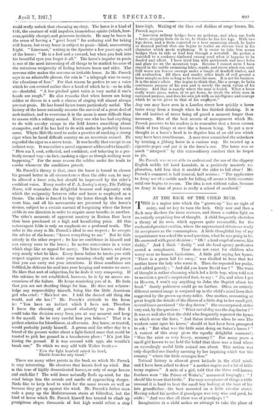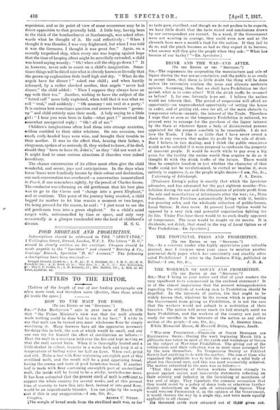AT THE BACK OF THE CHILD MIND.
is a region into which the " grown-up " has no right of
entry, and no key to turn tho lock. Only now and then a flash may disclose the inner recesses, and throw a sudden light on an entirely surprising line of thought. A child frequently cherishes a theory of its own, which appears quite reasonable, for the enchanted precincts within, where the supernatural obtains as ready an acceptance as the commonplace. A little thoughtful boy of my acquaintance was asked the usual question, what he was going to be. He answered with great decision : " Oh ! a land-angel of course, like daddy." And I think " daddy " and the laud agency profession scored a compliment. Time does not exist for children who worry over no human limitations. A little girl saying her hymn, " There is a green hill far away," was thrilled to hear that her mother knew the lady who wrote it. Then she repeated her psalm, and added gravely : " And did you know David too ? " The train of thought is rather charming which led a little boy, when told not to mention a guest's amputated foot, to say : "No, and when I get to Heaven, I won't say anything to John the Baptist about his head." Surely politeness could go no further. Often an entirely different mental image is conjured up in the child's mind from that suggested by the grown-up story-teller. One mother, recounting at great length the details of the illness of a little dog to her small girl, several times mentioned " the dog doctor." She was surprised, at the very end, by the question : " What sort of dog was the dog doctor ? " It was as well also that the child who frequently repeated the hymn in which occur the lines, " And Satan trembles when he sees The weakest saint upon his knees," should at last hal) been prompted to ask : " But what was the little saint doing on Satan's knees ? " A variant of this story gives the equally delightful comment:: "Was the saint so very heavy, mummy ?" For many years a small girl known to me held the belief that there was a land where an exceedingly useful little animal ran about. This notion was only dispelled one Sunday morning by her inquiring which vas the country " where the little sausages live."
Natural history is allowed great latitude in the child mind, and I have been asked to draw " a mother engine and a lot of little teeny engines." A mite of a girl, told that the three well-known feathers were " the Prince of Wales's," murmured longingly : " I should like to see that birdie." For easy acceptance of things a trifle unusual it is hard to beat the small boy looking at the bust of his late grandfather—the bust mounted on a little circular stand. Having asked hid mother if grandpapa was very wise and good, he adds : " And was that all there was of grandpapa ? "
Imagination in a child makes no attempt to take the place of
experience, and so its point of view of some occurrence may be in direct opposition to that generally held. A little boy, having been In the thick of the bombardment at Scarborough, was asked after- wards what he thought of it. He said reflectively : " When I thought it was thunder, I was very frightened, but when I was told it was the Germans, I thought it was great fun." Again, on a recently torpedoed ship, when every one was hoping against hope that the time of keeping afloat might be mercifully extended, a child was heard saying wearily: " Oh ! when will the ship go down ? " It is, however, never safe to count on a child's imagination. Some- times things will be fitted into what is already known so literally that the grown-up explanation finds itself high and dry. " What do the angels have for dinner ? " asked one child ; and when hastily informed, by a rather shocked mother, that angels " never had dinner," the child added : Then I suppose they always have an egg with their tea." Another, wishing to have the subject of the " fatted calf " more fully explained, when told that it was what we call " veal," said suddenly : " Oh mummy ! not veal at a party." It is curious how sometimes question and answer between grown- up " and child entirely miss their mark. A lady saying to a little girl : " I hear you were born in India—what part ? " received the somewhat unexpected reply : " Oh ! all of me."
Children's imaginations often lead them into strange anxieties, seldom confided to their older relations. On one occasion, two small, curly-headed boys were wise, and brought their trouble to their mother. It was to the effect that, hearing their father, a clergyman, spoken of as seriously ill, they wished to know, if he died, should they "have to have St. John's," as they "did not want it." It might lead to some curious situations if churches were indeed hereditary.
The chance conversation of its elders must often give the child wonderful, and secret, joys and anticipations. In the days when horse-' buses were familiarly known by their colour and destination, one such conversation was overheard—a conversation immortalized in Punch, if one remembers rightly, by the pencil of Charles Keene. The conductor was informing an old gentleman that his best plan was to go to the Circus and " change into a green Elephant," and so continue. This point of the journey being reached, a child begged its mother to let him remain a moment or two longer. On being pressed for the reason, he said : " I just want to see the old gentleman turn into a green elephant." So a child's mind ranges wide, untrammelled by time or space, and only very occasionally is a glimpse vouchsafed into the laud of childhood's



























 Previous page
Previous page